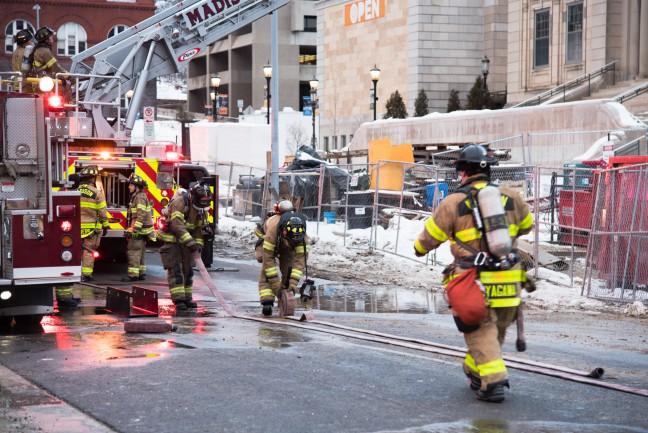Wisconsin Gov. Tony Evers signed Executive Order #110 declaring a state of emergency April 5 as the risk of wildfires across the state remains high.
According to a press release from the Wisconsin Department of Natural Resources, over 320 reported wildfires have ravaged roughly 1,400 acres so far this year. Evers declared the state of emergency just three days after wildfires forced some residents of Menomonee Falls to evacuate their homes, according to WISN.
The executive order will provide the DNR with assistance from the Wisconsin National Guard and allow access to the Guard’s Black Hawk helicopters for aerial fire suppression. All Wisconsin state agencies are also directed to support wildfire prevention, response and recovery efforts when appropriate.
Aerial fire suppression is not often the first response of firefighters trying to control an inferno, according to the BBC. Instead, the method works as a supplemental tool to help keep wildfires contained and manageable so firefighters on the ground can work to extinguish them.
According to the DNR’s press release, Wisconsin faces an extended fire season due to snow melting earlier than usual this year. Combined with dry vegetation, abnormally warm temperatures for this time of year, low humidity and increasing southern winds, the fire conditions in Wisconsin are expected to continue to worsen.
As a result of the heightened risk of wildfires, the DNR suspended burning permits and placed a ban on burning for about two-thirds of the state, according to the Wisconsin State Journal. This suspension will help prevent wildfires caused by embers from domestic brush and debris burning that are blown away by the wind, a common practice in the state.
DNR Wildfire Prevention Specialist Catherine Koele said human beings are largely to blame for the genesis of wildfires.
“Ninety-eight percent of our fires [in Wisconsin] are caused by people,” Koele said. “About half of the fires we’ve seen this spring are related to debris burning.”
The primary concern regarding wildfires is the potential threat to human lives and the destruction of property, but the impacts on Wisconsin’s wide variety of ecosystems are also worrisome.
According to the Wisconsin Prescribed Fire Council, many of Wisconsin’s ecosystems are adapted to be resilient and even thrive as a result of burning events — an often cited rationale for prescribed burnings that are utilized across the state.
University of Wisconsin Forest and Wildlife Ecology associate professor Adena Rissman said she does not believe the fires are located in areas which could actually cause regeneration for plant species, an after-effect of wildfires in some cases.
“I think a particular concern is many of these fires are not planned fires,” Rissman said. “They may be in people’s debris piles, they may be in campfires, but these fires are not necessarily in the locations that would be most beneficial for, let’s say, regenerating prairie or oak Savanna habitat.”
Wisconsin is not the only state bracing for a heightened wildfire season, according to NBC News, much of the western half of the country is also preparing for extreme fire weather. The National Weather Service issued red flag warnings in several western states, urging residents to take precautionary measures.
Typically, westernmost states have environmental and weather conditions that contribute to more significant wildfire events than those occurring in Wisconsin, according to Wisconsin Public Radio.
This year’s heightened risk of wildfires is not entirely out of the ordinary. Evers also declared a state of emergency in response to wildfires in April of 2020, according to the Wisconsin State Journal.
According to the Wisconsin Examiner, the environmental group Climate Power 2020 claims Wisconsin’s spike in more intense wildfires can be attributed to increasing droughts caused by climate change. Though climate change does not directly cause fires, it fosters the conditions, such as heatwaves and droughts, that can trigger wildfires, according to CBS News.
The DNR instructs Wisconsinites to avoid all outdoor burning, including campfires, and to ensure sure cigarettes are extinguished properly before disposal. In addition, the DNR suggests outdoor recreationists be mindful when using off-road vehicles or equipment that could possibly generate a spark or start a fire.
“We are going to be getting a little bit of rain, but don’t become complacent just yet,” Koele said. “The vegetation hasn’t fully greened up yet so the fire danger can change very quickly from day-to-day and we can be right back in high fire danger, so don’t put your guard down.”


